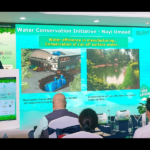Paving Path To A Greener Future With Carbon Capture

Experts shed light on the economic viability, policy implications and public perception of carbon capture in the Indian context
Musharrat Shahin
Carbon capture technology has become an essential part of the global decarbonisation effort, especially for difficult industries. India’s power demand is projected to grow significantly by 2070, with an increase in electricity consumption of about six to eight times cited by India’s National Electricity Plan (NEP).
Shelly Mittal, Climate Tech Founder at Stealth and former Shell Expert, emphasised carbon capture’s importance in decarbonising high-emission industries like cement, steel, and chemicals. As India’s economy grows, demand for these sectors will triple or even octuple by 2070. Carbon capture can play a pivotal role in achieving net-zero emissions without stunting industrial growth.
“The cost of emitting carbon must be higher than the cost of capturing it for industries to adopt the technology. Carbon capture is crucial for industries like cement, steel, and chemicals, which are essential to India’s growth,” she added.
Policy Challenges To Be Heard
The implementation of carbon capture and storage (CCS) technologies faces significant policy challenges that hinder their effectiveness and widespread adoption. Key issues include the lack of clear regulatory frameworks and guidelines, which create uncertainty for investors and developers.
Deepa Nagraj, Global Head of Communications from Sparkle Elevation Ecosystem, ESG, and CSR, AT Mphasis, highlighted that while policies for carbon capture exist, they are not rigorously enforced or followed by industries. She pointed out that without stronger regulatory frameworks and more aggressive policy enforcement, companies would continue to adopt carbon initiatives only when commercially beneficial, rather than as a legal obligation.
“Policies need to be ahead of time, considering the entire life cycle from manufacturing to shipping. We are really the last generation that can do something to stop the Earth from getting warmer,” she added.
Perception And Economic Viability
A study by downtoearth.org estimates that India will need to triple its energy generation to 18,900–22,300 terawatt-hours per year (TWh/yr) by 2070 to achieve net zero and develop its economy.
HC Vinayaka, VP of Technical, EHS and Sustainability at ITC Hotels, shared how public perception of carbon capture remains limited, especially when it comes to understanding the economic benefits. He highlighted the importance of making carbon capture economically viable to incentivise industries to adopt it. He shared that 12 ITC hotels have already achieved zero-carbon status, showing the feasibility of combining profitability and sustainability.
“Public perception remains a barrier, and the economic viability of carbon capture needs to be more widely understood. In our hotels, we’ve proven that sustainability can go hand-in-hand with profitability by achieving zero-carbon status in 12 properties,” he added.
Risks And Environmental Impact
Although carbon capture technology shows great promise in lowering atmospheric CO2 levels, its safe and efficient implementation depends on addressing the risks and environmental effects associated with it through strong regulatory frameworks, site selection procedures, and continuous research.
Mittal addressed the potential risks of carbon capture, such as the risk of underground CO2 leaks and the significant water requirements needed to implement carbon capture technologies. These risks need to be carefully managed, especially in a water-scarce country like India, to ensure carbon capture remains environmentally sustainable.
Every organisation must adopt a carbon neutrality mission by 2030 to meet India’s goal of net-zero emissions by 2070. The panellists agreed that carbon capture technology must be integrated with India’s broader climate strategy to ensure success. This involves setting ambitious goals for carbon neutrality within industries and establishing a robust policy framework that encourages innovation and private-sector participation.















































































































































































































































































































































































































































































































































































































































































































































































































































































































































































































































































































